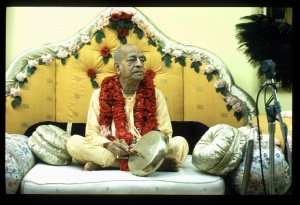CC Adi 3.12: Difference between revisions
m (1 revision(s)) |
No edit summary |
||
| Line 1: | Line 1: | ||
{{ | [[Category:Sri Caitanya-caritamrta - Adi-lila Chapter 03|C012]] | ||
<div style="float:left">'''[[Sri Caitanya-caritamrta|Śrī Caitanya-caritāmṛta]] - [[CC Adi|Ādi-līlā]] - [[CC Adi 3|Chapter 3: The External Reasons for the Appearance of Śrī Caitanya Mahāprabhu]]'''</div> | |||
<div style="float:right">[[File:Go-previous.png|link=CC Adi 3.11|Ādi-līlā 3.11]] '''[[CC Adi 3.11|Ādi-līlā 3.11]] - [[CC Adi 3.13|Ādi-līlā 3.13]]''' [[File:Go-next.png|link=CC Adi 3.13|Ādi-līlā 3.13]]</div> | |||
{{CompareVersions|CC|Adi 3.12|CC 1975|CC 1996}} | |||
{{RandomImage}} | |||
==== TEXT 12 ==== | ==== TEXT 12 ==== | ||
<div | <div class="verse"> | ||
dāsa-sakhā-pitā-mātā-kāntā-gaṇa lañā | :dāsa-sakhā-pitā-mātā-kāntā-gaṇa lañā | ||
vraje krīḍā kare kṛṣṇa premāviṣṭa hañā | :vraje krīḍā kare kṛṣṇa premāviṣṭa hañā | ||
</div> | </div> | ||
| Line 12: | Line 16: | ||
==== SYNONYMS ==== | ==== SYNONYMS ==== | ||
<div | <div class="synonyms"> | ||
''dāsa''—servants; ''sakhā''—friends; ''pitā-mātā''—father and mother; ''kāntā-gaṇa''—lovers; ''lañā''—taking; ''vraje''—in Vraja; ''krīḍā kare''—plays; ''kṛṣṇa''—Lord Kṛṣṇa; ''prema-āviṣṭa''—absorbed in love; ''hañā''—being. | |||
</div> | </div> | ||
| Line 19: | Line 23: | ||
==== TRANSLATION ==== | ==== TRANSLATION ==== | ||
<div | <div class="translation"> | ||
Absorbed in such transcendental love, Lord Śrī Kṛṣṇa enjoys in Vraja with His devoted servants, friends, parents and conjugal lovers. | Absorbed in such transcendental love, Lord Śrī Kṛṣṇa enjoys in Vraja with His devoted servants, friends, parents and conjugal lovers. | ||
</div> | </div> | ||
| Line 26: | Line 30: | ||
==== PURPORT ==== | ==== PURPORT ==== | ||
<div | <div class="purport"> | ||
The descent of Śrī Kṛṣṇa, the Absolute Personality of Godhead, is very purposeful. In the Bhagavad-gītā it is said that one who knows the truth about Śrī Kṛṣṇa’s descent and His various activities is at once liberated and does not have to fall again to this existence of birth and death after he leaves his present material body. In other words, one who factually understands Kṛṣṇa makes his life perfect. Imperfect life is realized in material existence, in five different relationships we share with everyone within the material world: neutrality, servitorship, friendship, filial love and amorous love between husband and wife or lover and beloved. These five enjoyable relationships within the material world are perverted reflections of relationships with the Absolute Personality of Godhead in the transcendental nature. That Absolute Personality, Śrī Kṛṣṇa, descends to revive the five eternally existing relationships. Thus He manifests His transcendental pastimes in Vraja so that people may be attracted into that sphere of activities and leave aside their imitation relationships with the mundane. Then, after fully exhibiting all such activities, the Lord disappears. | The descent of Śrī Kṛṣṇa, the Absolute Personality of Godhead, is very purposeful. In the ''Bhagavad-gītā'' it is said that one who knows the truth about Śrī Kṛṣṇa’s descent and His various activities is at once liberated and does not have to fall again to this existence of birth and death after he leaves his present material body. In other words, one who factually understands Kṛṣṇa makes his life perfect. Imperfect life is realized in material existence, in five different relationships we share with everyone within the material world: neutrality, servitorship, friendship, filial love and amorous love between husband and wife or lover and beloved. These five enjoyable relationships within the material world are perverted reflections of relationships with the Absolute Personality of Godhead in the transcendental nature. That Absolute Personality, Śrī Kṛṣṇa, descends to revive the five eternally existing relationships. Thus He manifests His transcendental pastimes in Vraja so that people may be attracted into that sphere of activities and leave aside their imitation relationships with the mundane. Then, after fully exhibiting all such activities, the Lord disappears. | ||
</div> | </div> | ||
__NOTOC__ | |||
<div style="float:right; clear:both;">[[File:Go-previous.png|link=CC Adi 3.11|Ādi-līlā 3.11]] '''[[CC Adi 3.11|Ādi-līlā 3.11]] - [[CC Adi 3.13|Ādi-līlā 3.13]]''' [[File:Go-next.png|link=CC Adi 3.13|Ādi-līlā 3.13]]</div> | |||
__NOTOC__ | |||
__NOEDITSECTION__ | |||
Revision as of 15:08, 14 July 2021

A.C. Bhaktivedanta Swami Prabhupada
TEXT 12
- dāsa-sakhā-pitā-mātā-kāntā-gaṇa lañā
- vraje krīḍā kare kṛṣṇa premāviṣṭa hañā
SYNONYMS
dāsa—servants; sakhā—friends; pitā-mātā—father and mother; kāntā-gaṇa—lovers; lañā—taking; vraje—in Vraja; krīḍā kare—plays; kṛṣṇa—Lord Kṛṣṇa; prema-āviṣṭa—absorbed in love; hañā—being.
TRANSLATION
Absorbed in such transcendental love, Lord Śrī Kṛṣṇa enjoys in Vraja with His devoted servants, friends, parents and conjugal lovers.
PURPORT
The descent of Śrī Kṛṣṇa, the Absolute Personality of Godhead, is very purposeful. In the Bhagavad-gītā it is said that one who knows the truth about Śrī Kṛṣṇa’s descent and His various activities is at once liberated and does not have to fall again to this existence of birth and death after he leaves his present material body. In other words, one who factually understands Kṛṣṇa makes his life perfect. Imperfect life is realized in material existence, in five different relationships we share with everyone within the material world: neutrality, servitorship, friendship, filial love and amorous love between husband and wife or lover and beloved. These five enjoyable relationships within the material world are perverted reflections of relationships with the Absolute Personality of Godhead in the transcendental nature. That Absolute Personality, Śrī Kṛṣṇa, descends to revive the five eternally existing relationships. Thus He manifests His transcendental pastimes in Vraja so that people may be attracted into that sphere of activities and leave aside their imitation relationships with the mundane. Then, after fully exhibiting all such activities, the Lord disappears.